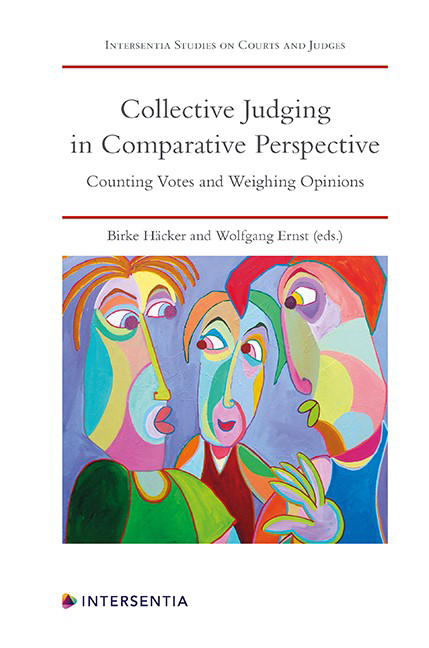Book contents
- Frontmatter
- Preface
- Contents
- List of Cases
- List of Contributors
- PART I DESIGNING COLLEGIATE COURTS’DECISION-MAKING PROCESSES
- PART II COLLEGIATE COURTS IN THE COMMON LAW TRADITION
- PART III COLLEGIATE COURTS IN THE EUROPEAN CIVIL LAW TRADITION
- PART IV COLLEGIATE COURTS IN A NON-EUROPEAN CIVIL LAW JURISDICTION: THE CASE OF JAPAN
- PART V SUPRANATIONAL AND INTERNATIONAL COLLEGIATE COURTS
- PART VI VOICES FROM THE AUDIENCE AND CLOSING REMARKS
- About the Editors
Chapter 11 - Collective Judging by Collegiate Courts in Japan
Published online by Cambridge University Press: 09 February 2021
- Frontmatter
- Preface
- Contents
- List of Cases
- List of Contributors
- PART I DESIGNING COLLEGIATE COURTS’DECISION-MAKING PROCESSES
- PART II COLLEGIATE COURTS IN THE COMMON LAW TRADITION
- PART III COLLEGIATE COURTS IN THE EUROPEAN CIVIL LAW TRADITION
- PART IV COLLEGIATE COURTS IN A NON-EUROPEAN CIVIL LAW JURISDICTION: THE CASE OF JAPAN
- PART V SUPRANATIONAL AND INTERNATIONAL COLLEGIATE COURTS
- PART VI VOICES FROM THE AUDIENCE AND CLOSING REMARKS
- About the Editors
Summary
INTRODUCTION
In this chapter, we will begin by briefly explaining the Japanese judicial system in order to provide a background for the discussion. We will then explain the decision-making process followed by the courts in Japan: first, in the Supreme Court, and second, in High Courts and District Courts.
JUDICIAL SYSTEM IN JAPAN
OVERALL STRUCTURE AND THE COMPETENCE OF DIFFERENT COURTS
Let us first give you an outline of the judicial system in Japan. As shown in figure 1, it is a three-instance system. The first instance is District Court and Family Court. There are 50 District Courts and 50 Family Courts. They decide issues of both facts and law. The next instance is the High Court level. There are eight High Courts. They handle appeals from District Courts and Family Courts, and also decide issues of both facts and law. The final body of appeal is the Supreme Court. It is located in Tokyo and it handles appeals from High Courts, and it usually decides on issues of law only.
JUDICIAL BODIES WITHIN EACH INSTANCE
Let me move on to the next part, concerning the kinds of judicial bodies and the cases they handle (see figure 2).
At District Court level, most cases are handled by single judges, with all remaining cases being handled by a three-judge panel.
As regards civil cases, a single-judge court in theory has the power to handle any case whatsoever. However, in practice, complex cases involving important legal or factual questions are generally referred to three-judge panels. Some examples are administrative law cases, medical malpractice cases, patent cases, and cases involving judicial constitutionality review.
As regards criminal cases, while most are similarly handled by single-judge courts, the law requires that cases concerning certain major offences are to be handled by a collegiate court.
There are two kinds of collegiate courts, one being a three-judge panel, the other being a panel of three professional judges and six citizens selected at random from registered voters. The latter court deals with cases in which there is a possibility of severe punishment, for instance the death penalty or life imprisonment. We will explain this unique court later on in our contribution.
- Type
- Chapter
- Information
- Collective Judging in Comparative PerspectiveCounting Votes and Weighing Opinions, pp. 207 - 224Publisher: IntersentiaPrint publication year: 2020
- 1
- Cited by



